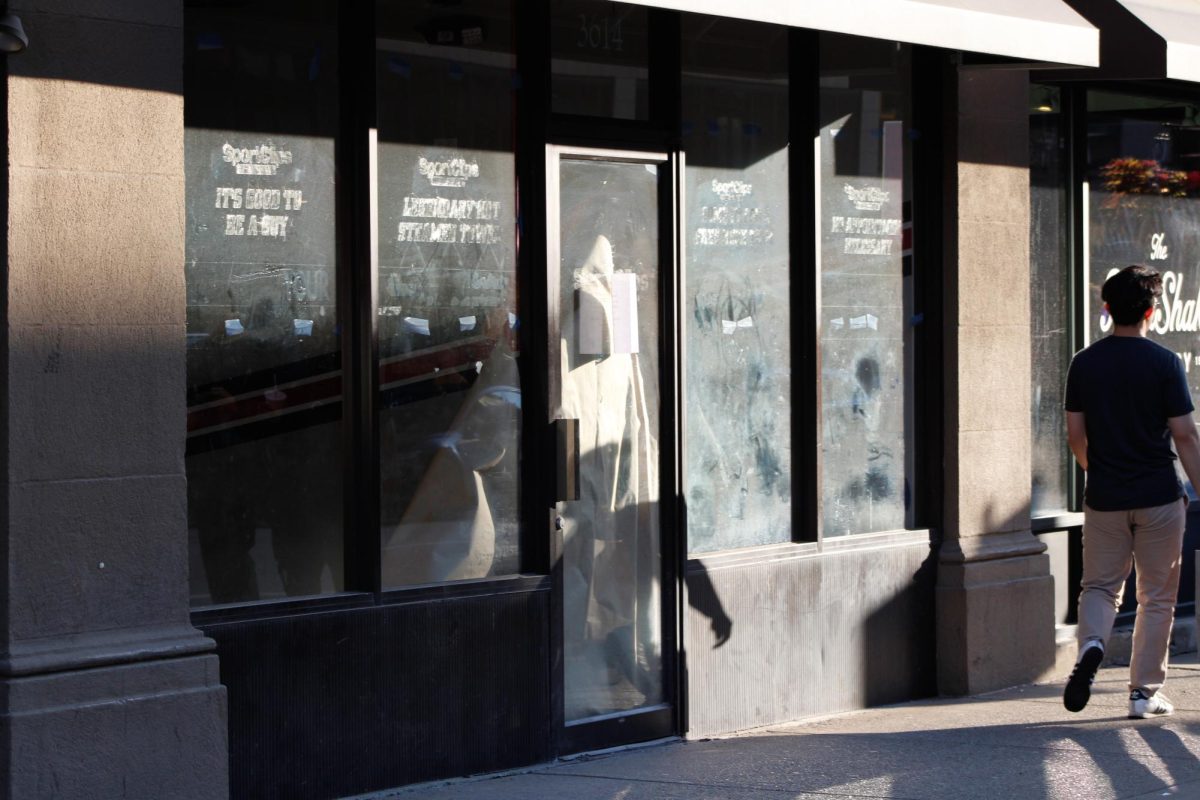Some of the vacant properties sitting empty in Oakland are a “nuisance to the neighborhood,” according to Oakland Planning and Development Corporation, because they could be used for a local business or a place for students to congregate.
The business on Forbes and Fifth avenues has gone through extreme turnover in the past few years, with many independently owned businesses converting into chain restaurants. Andrea Boykowycz, an OPDC member and a member of The Pitt News Advisory Board, said she feels that Pitt’s campus has an overabundance of chain businesses.
According to the National Bureau for Labor Statistics, 56% of businesses surveyed reported a decrease in demand for their services due to the COVID-19 pandemic, and the effects of that are still being seen today. Increases in rent and poor traffic flow are some of the reasons why local businesses are struggling to keep their doors open.
Boykowycz said she feels the “chainification” of college campuses and urban centers is a national problem.
“When you are representing the owners of the buildings in the business districts, it can sometimes be tricky to foster risk,” Boykowycz said. “It’s not always clear to the property owners that they have a vested interest in there being a real diversity of different kinds of businesses.”
There are many storefronts on Forbes and Fifth Avenues where a local business turned into a chain business, one example being the Thirsty Scholar turning into Raising Canes.
Boykowycz said the increase in chain businesses has been “detrimental to the quality of student life.”
“There were so many more things to do,” Boykowycz said. “There were two movie theaters. There were five or six different live music venues. For a while, there was a bowling alley. And at the moment, there’s [nothing] to do, except eat and drink at all of the bars and restaurants in the area.”
Boykowycz said many of the storefronts on Forbes and Fifth are owned by bigger companies, whereas the locations in between, like Oakland Avenue and Atwood Street, are owned by smaller owners. She explained that the rents have increased to the point where only big chains can afford them, which results in a tendency for local businesses to be pushed out.
Iwam Yevio, a junior neuroscience major, said the overabundance of chicken and chain restaurants made it hard for her to go out to eat.
“There’s too many chicken spots,” Yevio said. “I was allergic to chicken, and I was vegan at one point, and it felt like I couldn’t find a single thing I could eat at because the restaurants were all chicken spots. I wish there were some more local places because they can be cheaper.”
Yeabsira Temesgen, a junior business information systems major, said the chain restaurants around campus are not appealing to her.
“I don’t really rock with all the bigger stuff on Forbes. I like the smaller shops,” Temesgen said. “I would like to see some authentic Mexican food, because I don’t think we have any good Mexican food here.”
Boykowycz also said that the way that the traffic is set up causes problems.
“It’s very difficult for trucks to load,” Boykowycz said. “When trucks pull up to stock the stores and stuff like that, they back up traffic. And everybody’s pissed, like, pissed. It’s a big problem.”
Boykowycz also said street traffic on Forbes and Fifth causes traffic problems when the trucks pull over to stock the restaurants. Heavy traffic deters people from driving into Oakland to support these businesses, especially because parking is limited.
“All of the businesses here are sustained by foot traffic,” Boykowcyz said. “It’s nice to be able to, if you have the option, come into Oakland to do something. But chances are there’s nothing that is so unique in any of the businesses here that you would actually take the trouble to find parking and drive into Oakland.”
Temesgen said she thinks local businesses probably have a hard time retaining customers because students only live in Oakland for nine months of the year.
“I would probably guess something about inconsistency with student business in the summers,” Temesgen said. “It’s probably inconsistent with the student schedule. I also personally wouldn’t want to deal with students, and I wouldn’t want to be employed at one of those places, so it’s probably hard to employ people there.”
Boykowycz said that in previous years the Forbes and Fifth business district looked very different in years past. She recounted how the roads were not one-way and the many entertainment attractions on Forbes and Fifth.
“It’s really important for students to understand, across the board, this is the way things are, but this is not the way things have always been or the way things always have to be, and change is possible,” Boykowycz said.


